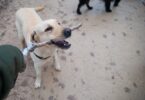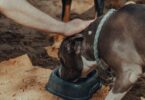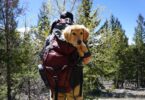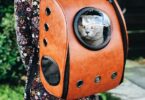Pets often have the desire to explore. That’s why they’re so loved. However, they’re not able to observe themselves or be capable of telling us when something is wrong. Our job as pet owners is to act as their caregivers and guardians. Winter brings wet and cold weather that could pose the pet with a risk. In the event that your dog is an outdoor pet or is outdoors for the majority all the time, this post will offer you some suggestions to help keep you and your outdoor pet secure and warm during the winter.
1. Housing
It is crucial to ensure adequate protection from the elements during winter. This means having a shelter that is warm, dry, and clean bedding. It should also provide shelter from the wind, be able to withstand strong winds, be waterproof, with a slanted roof and be big enough to let your pet be able to stand and walk inside. It’s recommended to construct a four to six inches platform for your pet’s bedding. It will help keep him clean in case of water enters the dog’s house. Heating pet mats as well as electric space heaters are employed by some dog houses, but the danger of electrical burns or fire to your pet renders these devices unsuitable. Every now and then, examine the dog’s area to ensure that there aren’t any leaks. The most important thing is to see your dog sleeping on a filthy pet bed. If your pet is inside in winter it is best to have a platform that keeps his bed from the ground and out of the cold. Dog beds that are heated are readily widely available and are ideal for elderly or arthritis-prone dogs.
2. Warm Clothing
The fact that your dog is wearing fur coats doesn’t necessarily mean that he’s warm. A rainproof coat is a great alternative if you wish to ensure that your dog is cozy enough to withstand the elements. Velcro jackets are simple to put on and take off your pet quickly, and polar fleece is a perfect warm interior. Certain dog jackets have hoods. Breeds with long coats, such as Alaskan Malamutes, Siberian Huskies, Mastiffs, and Samoyeds are likely to not require additional protection. Dog booties can be another method to shield your dog’s paws from snow, ice, and melt of ice. Even if you own an animal with a moderate to heavy coat, exposure to cold temperatures can cause them to be susceptible to freezing. The most commonly affected areas of frostbite can include your dog’s ears, feet, and tail. Some signs of frostbite include:
- Discoloration
- Pain
- The area affected is swelling.
It is important to remember the fact that puppy dogs are much more vulnerable to colder weather than fully grown adult dogs. If you suspect that your dog’s frostbite has occurred then wrap the exposed areas in a blanket immediately and contact your vet. Hairless dogs or those with thin coats shouldn’t be left outside for extended durations of time. Wear warm clothing and go for less frequent walks than would normally. This is also true for pets suffering from diabetes kidney disease, heart disease, or Cushing’s disease. These ailments make it more difficult for pets to control their body temperature.
3. FreshWater
All pets must have access to clean water. This includes checking their water bowls outdoors every day to ensure that they’re clean and not frozen. A lot of dog owners make the mistake of leaving their water bowls unattended and full of dirty water and trash. Water bowls with thermal insulation that stop the freezing water are available at pet stores and on the internet.
4. Garage Dangers
In the winter months, the warm engine of a car can attract wild or feral cats. If this is the case in your area, make sure you check under the car’s hood vehicle prior to starting the engine. Another risk lurking inside the garage (or the driveway) can be the presence of antifreeze. Ethylene glycol is an essential ingredient in a variety of antifreeze mixes and its delicious taste is attractive to pets. If a small amount of it is taken in by your pet, it could cause death. If you suspect that your pet has eaten any amount of antifreeze containing the chemical ethylene glycol, you should contact your veterinarian right away.
5. Proper Nutrition
Pets also need access to a healthy diet. Outdoor pets are likely to consume more calories during the winter than during the summer. Be careful not to feed your dog if they’re predominantly indoors during the winter months, or you’ll end up having an overweight dog. Food supplements are only needed for dogs who are outdoors for a large portion of the winter season or are very active. Talk to your vet to make sure that your pet is safe to be an outdoor pet in winter and to get their advice on your dog’s nutritional requirements.









Leave a Comment